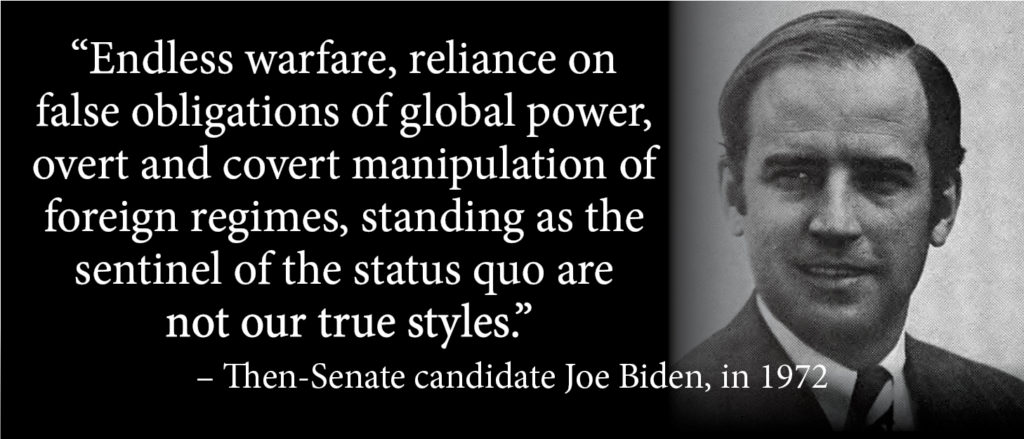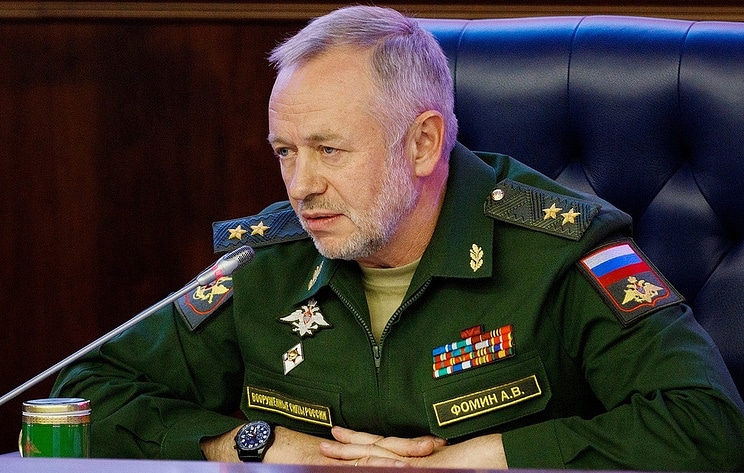
Report: Incoming Biden Administration to Review Costly US Nuclear Weapons Programs
Morgan Artyukhina / Sputnik News
(December 24, 2020) — US President-elect Joe Biden will face a slew of tough issues left over from the Trump administration, with perhaps none bearing greater weight than the US’ nuclear weapons policies.
Under US President Donald Trump, billions of dollars have been pumped into revamping the US nuclear arsenal and introducing new nuclear weapons into the stockpile, while the US has withdrawn from, or done nothing to stop the expiration of, key arms limitation treaties designed to reduce the risk of nuclear war.
According to a recent report by the Wall Street Journal, Biden intends to conduct a critical and thorough review of those weapons programs and to reverse course on at least one treaty: the New Strategic Arms Reduction Treaty (New START), which expires just 16 days after his inauguration.
According to the report, some of the programs Biden will review include the Ground Based Strategic Deterrent (GBSD), which aims to replace the aging Minuteman III intercontinental ballistic missile (ICBM); the Long-Range Standoff Weapon (LRSO), a nuclear-tipped cruise missile currently in development; and a proposed sea-launched cruise missile.
Other weapons include the US’ largest nuclear warhead, the B83-1; and its smallest, the W76-2, as well as the W93. The latter two are new, introduced by the Trump administration for ballistic missile submarines.

The costly programs are expected to total in the hundreds of billions of dollars, with the GBSD rocket costing $264 billion by itself, not including the new warhead it will require. However, supporters say the weapons are needed to replace older systems soon to become obsolete, including the Minuteman III and the AGM-86 nuclear cruise missile.
The W76-2 aroused particular ire when it was proposed following the 2018 Nuclear Posture Review. With an explosive yield of just 5-6 kilotons, critics fear it could make the use of nuclear weapons more likely, which could set off a cataclysmic chain of events. Lawmakers attempted to block funding for its development, but it nonetheless entered service earlier this year.
The fear proved to be more than idle when the US Joint Chiefs of Staff accidentally published an unclassified internal document in June 2019 that revealed its outline for how to introduce nuclear weapons into non-nuclear conflicts.
“Employment of nuclear weapons can radically alter or accelerate the course of a campaign,” the document noted. “A nuclear weapon could be brought into the campaign as a result of perceived failure in a conventional campaign, potential loss of control or regime, or to escalate the conflict to sue for peace on more-favorable terms. The potential consequences of using nuclear weapons will greatly influence military operations and vastly increase the complexity of the operational environment.”
Recent articles in Defense News and the Brookings Institution think tank have called for the incoming Biden administration to issue a new Nuclear Posture Review in order to assess “how the Trump administration’s internal nuclear policy decisions have negatively affected possible initiatives to reduce nuclear risks and address any potential problems immediately,” as one op-ed put it.
Biden has so far not given details about how he will approach specific nuclear weapons programs, aside from his explicit support for extending New START, but he seemed to support a no-first-use policy in an op-ed earlier this year.
“As I said in 2017, I believe that the sole purpose of the US nuclear arsenal should be deterring — and, if necessary, retaliating against — a nuclear attack,” Biden wrote in the March-April edition of Foreign Affairs. “As president, I will work to put that belief into practice, in consultation with the US military and US allies.”
In addition, the Democratic Party’s platform adopted at the July convention where Biden was nominated as its presidential candidate called Trump’s proposal for new nuclear weapons “unnecessary, wasteful, and indefensible.”
Russia Hopeful on New START Treaty with Biden

Deputy Defense Minister Alexander Fomin
Russian Defense Ministry does not rule out US might revise its stance on New START
MOSCOW (December 27, 2020) — The United States’ attitude to prolonging the Measures for the Further Reduction and Limitation of Strategic Offensive Arms (New START) may change by virtue of political reasons, Russia’s Deputy Defense Minister Alexander Fomin told the government-published daily Rossiiskaya Gazeta in an interview on Sunday.
“Russia invited the United States to prolong the New START and simultaneously get down to joint work to draft a new agreement that would take into account all factors influencing strategic stability. At the same time, as I have already said, the American side has different priorities, for which reason it has shown no interest in extending the treaty. In the light of the current political situation in the United States we do not rule out that the US stance on this issue may change,” Fomin said. He recalled that the current treaty would stay effective until February 5, 2021.
Fomin stressed that the United States had for a long time pushed ahead with a policy of building up its military potential.
“On a variety of far-fetched pretexts, the American side has relinquished its obligations in the field of arms control that impede attempts at trying to achieve global supremacy. After quitting the ABM Treaty in 2002 the US terminated the Intermediate Nuclear Forces Treaty,” he said.
In order to minimize the negative effects of the United States’ pullout from the INF Treaty Russia asked NATO countries to join its moratorium on the deployment of intermediate and shorter range missiles.”
“A major instrument of implementing our proposals might be created by taking mutual verification measures regarding the weapon systems causing concerns on either side (Russia finds worrisome the universal launchers Mk-41 in Romania and Poland, and the United States, the 9M729 missiles), Fomin said.
“If our call fails to meet with support and US missiles begin to be deployed in Europe, we reserve the right to take proportionate retaliatory measures,” he warned.
Fomin underscored Russia’s concern over the US decision to quit the Treaty on Open Skies.
“We hope that the treaty will nevertheless retain its positive potential. Future policies regarding the Open Skies treaty will be determined in accordance with the readiness of other signatories to guarantee they will refrain from passing to the American side the information gathered as a result of monitoring flights over Russia’s territory. We will keep a close watch on the situation involving the Open Skies Treaty and take decisions proceeding from the interests of national security,” Fomin said.

INF Treaty Dispute
The United States suspended compliance with the INF Treaty on February 2, 2019 due to Russia’s alleged violations. For the first time Washington accused Moscow of being in breach of the INF Treaty in July 2014. The US administration argued that Russia’s 9M729 missile violated the terms of the agreement signed between Moscow and Washington in 1987.
Moscow dismissed all of Washington’s charges and put forward a number of its own counterclaims over the United States’ non-compliance with the agreement, for instance, the US missile defense systems in Europe. The United States warned that under article 15 it would quit the treaty, unless Russia agreed to meet certain demands, including the elimination of the 9M729 missile in the first place. Moscow dismissed Washington’s demands as an unacceptable ultimatum.
However, as John Bolton, the then US presidential national security adviser said later, Washington dropped the INF Treaty mostly because China was not a party to it.
In September 2019, it was announced that Russian President Vladimir Putin had addressed the leaders of some countries, including NATO members, with a proposal for imposing a freeze on the deployment of the intermediate and shorter range missiles in Europe and some other regions. The United States in fact eventually dismissed this initiative.
Posted in accordance with Title 17, Section 107, US Code, for noncommercial, educational purposes.